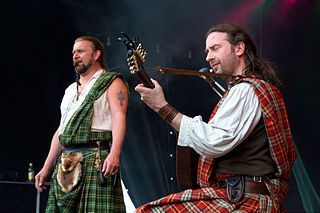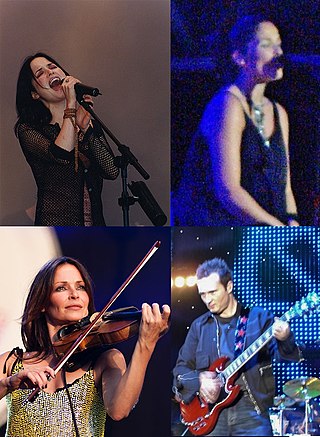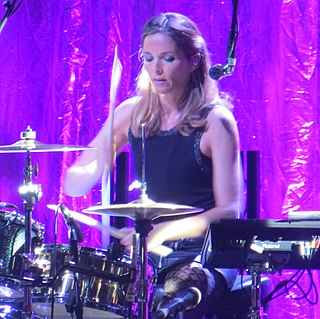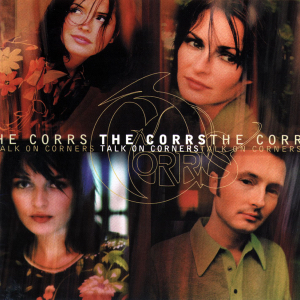Related Research Articles

Celtic music is a broad grouping of music genres that evolved out of the folk music traditions of the Celtic people of Northwestern Europe. It refers to both orally-transmitted traditional music and recorded music and the styles vary considerably to include everything from traditional music to a wide range of hybrids.

The tin whistle, also known as the penny whistle, is a simple six-holed woodwind instrument. It is a type of fipple flute, putting it in the same class as the recorder, Native American flute, and other woodwind instruments that meet such criteria. A tin whistle player is called a whistler. The tin whistle is closely associated with Irish traditional music and Celtic music. Other names for the instrument are the flageolet, English flageolet, Scottish penny whistle, tin flageolet, or Irish whistle.
The folk music of England is a tradition-based music which has existed since the later medieval period. It is often contrasted with courtly, classical and later commercial music. Folk music traditionally was preserved and passed on orally within communities, but print and subsequently audio recordings have since become the primary means of transmission. The term is used to refer both to English traditional music and music composed or delivered in a traditional style.

Irish music is music that has been created in various genres on the island of Ireland.

The Corrs are an Irish family band that combine pop rock with traditional Irish themes within their music. The group consists of the Corr siblings: Andrea, Sharon, Caroline and Jim. They are from Dundalk, County Louth, Ireland.
Irish set dancing, sometimes called "Irish sets", is a popular form of folk dancing in Ireland danced to Irish tunes in groups of eight or four dancers. It is also sometime named set dance, but this name refers more often to a kind of dance in Irish stepdance.

Caroline Georgina Corr MBE is an Irish singer and drummer for the Celtic folk rock band The Corrs. In addition to the drums, she plays the bodhrán, cajón, percussions and piano.

Talk on Corners is the second studio album by Irish family pop rock band The Corrs. It was released on 17 October 1997 by 143, Lava and Atlantic Records. Preceded by lead single "Only When I Sleep", which became a top ten hit internationally, the album was an immediate commercial success in several territories, including Ireland, Spain, Sweden, Denmark, Australia, New Zealand and Japan. Its commercial performance elsewhere was initially modest, however.

The Corrs Unplugged is the third album by Irish band The Corrs, filmed and released in the fall of 1999. The album is part of the iconic MTV Unplugged series, which features musicians performing in a more acoustic, “stripped-down” concert setting. Initially, the album was released internationally, albeit not in the United States until a year later, after the band had experienced further success with their single “Breathless” and their fourth album In Blue, with both releases earning them their highest chart positions to-date in the US.
British folk rock is a form of folk rock which developed in the United Kingdom from the mid 1960s, and was at its most significant in the 1970s. Though the merging of folk and rock music came from several sources, it is widely regarded that the success of "The House of the Rising Sun" by British band the Animals in 1964 was a catalyst, prompting Bob Dylan to "go electric", in which, like the Animals, he brought folk and rock music together, from which other musicians followed. In the same year, the Beatles began incorporating overt folk influences into their music, most noticeably on their Beatles for Sale album. The Beatles and other British Invasion bands, in turn, influenced the American band the Byrds, who released their recording of Dylan's "Mr. Tambourine Man" in April 1965, setting off the mid-1960s American folk rock movement. A number of British groups, usually those associated with the British folk revival, moved into folk rock in the mid-1960s, including the Strawbs, Pentangle, and Fairport Convention.
Celtic rock is a genre of folk rock, as well as a form of Celtic fusion which incorporates Celtic music, instrumentation and themes into a rock music context. It has been prolific since the early 1970s and can be seen as a key foundation of the development of successful mainstream Celtic bands and popular musical performers, as well as creating important derivatives through further fusions. It has played a major role in the maintenance and definition of regional and national identities and in fostering a pan-Celtic culture. It has also helped to communicate those cultures to external audiences.
Celtic fusion is an umbrella term for any modern music which incorporates influences considered "Celtic", or Celtic music which incorporates modern music. It is a syncretic musical tradition which borrows freely from the perceived "Celtic" musical traditions of all the Celtic nations, as well as from all styles of popular music, it is thus sometimes associated with the Pan-Celtic movement. Celtic fusion may or may not include authentic traditional music from any one tradition under the Celtic umbrella, but its common characteristic is the inspiration by Celtic identity.

1000 Years of Popular Music is a 2003 live album by Richard Thompson.
"I'll Tell Me Ma" is a traditional children's song. It was collected in various parts of the United Kingdom in the 19th century and again appears in collections from shortly after the turn of the 20th century. In Ireland, especially within Ulster, the chorus usually refers to Belfast city and is known colloquially as "The Belle of Belfast City", although it is also adapted to other Irish cities, such as Dublin. Other versions refer to the "Golden City" or "London City". This song is Roud Folk Song Index number 2649.

Neil Yates is a British jazz and folk musician.

Irish traditional music is a genre of folk music that developed in Ireland.

The Talk on Corners Tour is the second concert tour by Irish band the Corrs. Beginning in November 1997, the tour supported the band's second studio album, Talk on Corners. To date, it is their longest tour, with over 150 dates across Europe, Asia, Australia, New Zealand, and North America. The tour began with the band performing in theatres and nightclubs and, as the record’s success grew, progressed to arenas and amphitheatres, along with the group’s usual appearances at a variety of international music festivals.

The Forgiven, Not Forgotten World Tour was the premiere international concert tour by Irish folk-rock band the Corrs. The tour was in-support of the band’s debut album, Forgiven, Not Forgotten. It began on 26 April 1996 in Ennis, Co. Clare, in Ireland, and concluded nearly ten months later in Launceston (Tasmania), Australia, on 21 February 1997.
TradFest is an annual music and culture festival that takes place at the end of January in Dublin, Ireland. Founded by the Temple Bar Company, a not-for-profit organisation who work on behalf of businesses in the cultural quarter of Temple Bar, Dublin, as well as programming events on Moore Street and in Fingal, this festival celebrates Irish traditional and folk music and cultural offerings. It was launched on January 26, 2006.
"Haste to the Wedding" is a jig tune in the English, Scottish and Irish musical traditions. The tune originated during the 18th century, although its original composer is not certain. Written in the standard 8-bar AABB format of Gaelic music, it is traditionally performed on the fiddle, but is a simple tune which can be performed on a variety of instruments, and is frequently adapted for session music. The tune has also been used as the basis for songs, and as musical accompaniment for ceili dances of the same name.
References
- ↑ Ng, Alan. "Irish Tune Info (search by tune name)".
- ↑ Jones, Simon (21 May 2023). "Celtic Fingers - An Appreciation Of Johnny Fean". Spiral Earth. Retrieved 16 April 2024.
- ↑ "Toss the Feathers at Pride of Manchester".
- ↑ "Toss the Feathers – Irish trad music band in Albany NY". www.tossthefeathers.band.